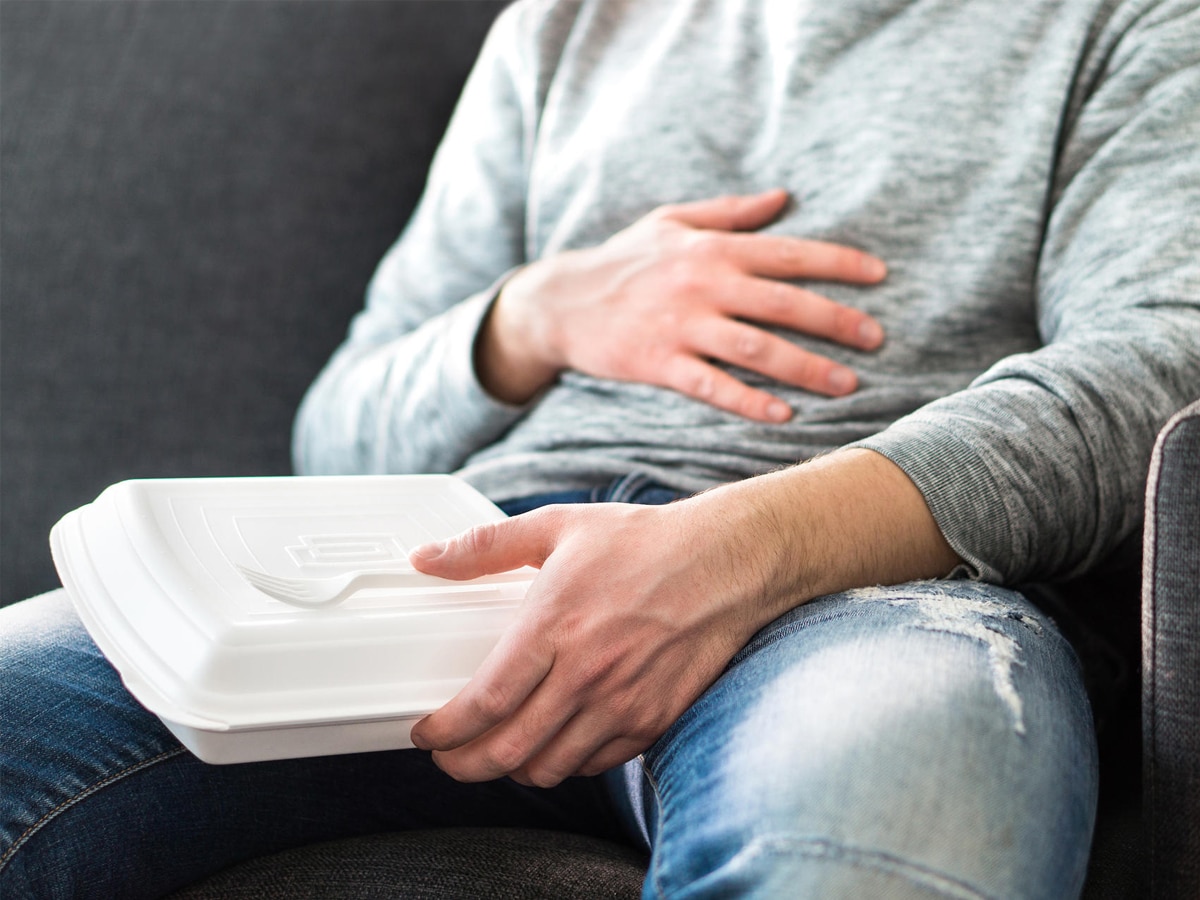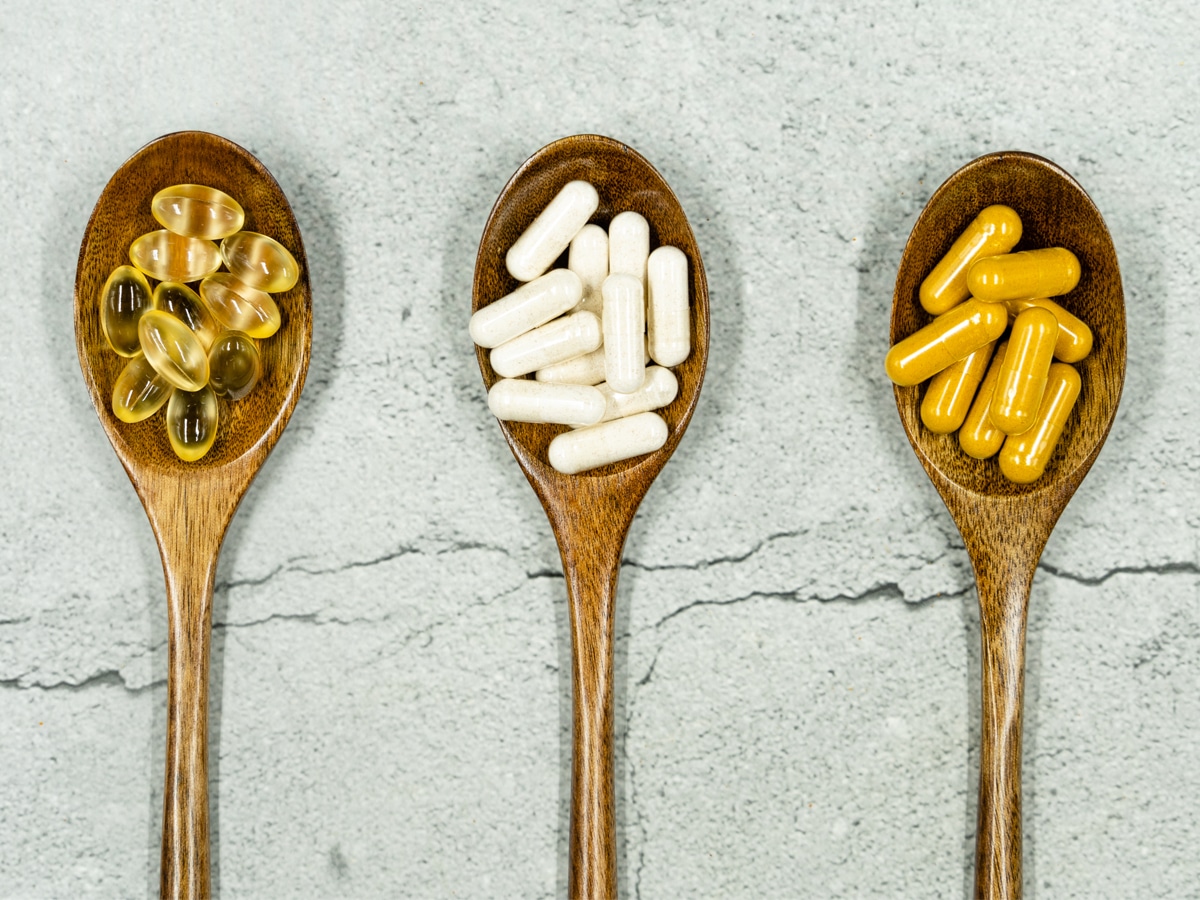Readtime: 11 min
Every product is carefully selected by our editors and experts. If you buy from a link, we may earn a commission. Learn more. For more information on how we test products, click here.
Ah the dreaded bloated belly. We get it, you’re tired of undoing the top button of your pants every time you have a big meal, you’re literally sick of feeling sick and heavy after eating. It’s about time you had some sure-fire healthy ways to reduce bloating when it arises.
Everyone has experienced bloating at least once before, and it can make you feel self-conscious, or even embarrassed by your eating habits. First things first, understand that it’s completely normal to experience bloating (gas is a natural by-product of digestion after all). However, if you’re frequently feeling rough after meals, it might be worth investigating the cause of your bloating. If you’re ready to find out more about what might be causing your cramps and what might help improve the discomfort, read on for our 10 ways to reduce bloating.

What is Bloating?
Bloating is most commonly caused by an excess of gas production, causing disturbances to the muscle movements of the digestive system. Too much gas and broken-down foods in your system cause your stomach to expand, giving you that swollen and sometimes painful bloating experience. Overeating and intolerances to certain foods can also lead to a bloated stomach, with the latter being due to stomach bacteria reacting abnormally to a certain food or drink.
It’s very common for people to feel bloated, whether it be from overeating or an intolerance to certain foods or drinks, and it’s nothing to feel embarrassed about.

How to Get Rid of Bloating
Learning effective ways to reduce bloating can result in happier times eating, and less self-consciousness if bloating does occur. For 10 ways to reduce bloating, read on, and thank us later.
1. Don’t Eat Too Much at a Time
Picture this, you’re at your family Christmas dinner or lunch, your Dad’s just revealed the mouth-watering glazed ham to oo’s and ah’s from the family, your Aunt’s carving the Christmas turkey, and Nan’s pulled out homemade cheesecake for dessert. Now we know, you’re going to want to (scratch that, you just have to) try it all, but the amount of food you’re eating may be what causes your bloating. Eating less, however, doesn’t mean sacrificing the Christmas turkey, or hurting dear old Nan’s feelings by not having any of her homemade cheesecake.
To prevent overeating, and in turn, bloating, you should be practicing portion control. Portion control means having little bits of everything rather than an excess of each dish. Through portion control, you can still try everything on offer, but in smaller portions that you can eat until you’re satisfied rather than when you’re full and bloated. What can also be helpful when it comes to overeating is sitting and waiting a few minutes before plating up a second serving or ordering that side of chips. By allowing your stomach to digest, you may find that your first serving was just what you needed to leave you feeling satisfied. Accredited Practising Dietitian Hannah Powter recommends tapping into mindful eating if you find yourself overeating constantly. “If you have a tendency to overeat, try to be more present at meals. Focus on the smells, the taste, and ensuring you are chewing your food thoroughly. This way you can listen to your hunger cues, and stop when your body is telling you you’ve had enough”.
2. Eat Slower
Along with the portion controlling is the suggestion of eating slower. When you’re eating your food like somebody’s going to take it away at any minute, you tend to take in a lot more air. This excess air adds to the already excess gases in your stomach and will make you feel bloated and gassy. To reduce this bloating, chew on your food for longer. This will not only make you eat slower but will also mean that less air is swallowed as you eat. With this slower eating habit, you can even take the time to enjoy the flavours of your meal. Who knows, you may notice something you’ve never picked up before in a dish that you really like.

3. Check For Any Food Allergies and/or Intolerances
Food allergies and intolerances are often confused as the same thing because they sometimes cause similar gastrointestinal symptoms (e.g. stomach pain, diarrhoea, and bloating). Make no mistake however, they are quite different. Allergies are caused by the immune system, and can cause severe and dangerous reactions to even the smallest exposure of a food. Whereas food intolerances cause symptoms locally in the digestive system and do not have the potential to be life threatening. They can however still heavily impact on daily life, and are far from pleasant, so understanding if this is contributing to your bloating is certainly worth investigating.
It is important to see your doctor for more information, if you are concerned your symptoms may be caused by a food allergy or intolerance.
4. Avoid Swallowing Air and Gases
As mentioned earlier, swallowing excess air is a leading cause of bloating for many people. What can also add to these excess gases in the system are carbonated drinks, ranging from soft drinks to alcoholic beverages. If soft drinks are causing you to bloat, try swapping them out for water or juice. As for alcohol, non-sparkling wines and spirits without post-mix can also be swapped in for carbonated alcoholic beverages to prevent bloating.
The second worst offender for excess air and gases is chewing gum. As the name suggests, chewing gum encourages chewing, which without swallowing increases the air going into your digestive system and getting trapped. So, if it’s a fresh breath you’re looking for, try a mouthwash or an oral strip instead.

5. Cut Back on Foods That Give You Gas
If a certain food you’re eating is giving you gas, you can try reducing how much you consume of that food. Whether you have a known intolerance or not, it might be to cut back on these foods if you’re experiencing bloating and discomfort. There are some foods that tend to release intestinal gases just through consumption. Cabbage, falafel and the musical fruit that makes you toot (beans) are some common culprits that you may want to cut back on. Consider that a lot of these foods are really nutritious for you and help to feed the good bacteria in your gut, so it is not recommended to cut all these foods out, unless you know which specific food may be causing the bloating.
You may also like:
10 Top Health Benefits of Quinoa
5 Surprising Health Benefits of Sleeping Naked
10 Common Men’s Health Myths Debunked
6. See a Dietitian to Trial a Low-FODMAP Diet
FODMAP, standing for Fermentable Oligo-, Di-, Mono-saccharides And Polyols, represent carbohydrates that are not properly digested or absorbed in the gut, and can trigger symptoms such as bloating in people with Irritable Bowel Syndrome (IBS). And while it may be tempting to leap into action and cut out all the high-FODMAP foods, this may be challenging to do on your own. “The FODMAP diet is complex, however when done with a Dietitian, can make a world of difference to your symptoms” says Accredited Practising Dietitian, Hannah Powter. “This is because the diet itself is quite confusing, and is also highly restrictive. Often clients don’t know what to eat and this can negatively affect their health without professional guidance. The low-FODMAP diet is not designed to be followed for longer 6 weeks, where we would aim to start reintroducing foods to identify exactly which foods are causing you symptoms”. Who wants to go for the rest of their life without garlic if you don’t have to!
7. Be Careful With Sugar Alcohols
By sugar alcohols, we’re not referring to margaritas or vodka cruisers. Sugar alcohols (including mannitol, sorbitol and others that end in an “ol”) are another high-FODMAP ingredient that can be poorly digested by your gut. Be aware that small amounts of sugar alcohols are found naturally in fruits and vegetables. When they are used as a sugar substitute in sugar-free gums, chocolate and some other sugar-free foods, they are often found in larger amounts. While these alternatives to sugar can help cut down your sugar intake, consuming large amounts of these sugar alcohols can lead to side effects like bloating and excess gas.

8. Try Some Digestive Enzyme Supplements
If none of the actions above have helped with your bloating, another option to consider is trying digestive enzyme supplements. These over the counter supplements may help to ease bloating and the associated pains. It is worth noting however, that there is limited research to suggest that digestive enzyme supplements actually work, however if it’s something you want to try, you definitely can. Before rushing out to buy some however, it’s always best to speak with a health professional (e.g. pharmacist, doctor or dietitian) before starting, as supplements can interfere with other medications.
9. Take Probiotics
Probiotics are another tool that may help ease your bloating, and research has shown their effectiveness in reducing IBS symptoms such as bloating. It is important to note that probiotics will not fix the root cause of the issue, similar to the digestive enzymes, and their effectiveness may also depend on the specific strains. If it is something you do want to trial, they are easily available over the counter.
10. See a Doctor
Finally, for our list of the 10 ways to reduce bloating, we recommend that you see a doctor if you need additional support around reducing frequent bloating. This will help determine if your bloating is being caused by a more serious issue, and what actions will need to be taken moving forward.
You may also like:
- Top Health Benefits of Quinoa
- Surprising Health Benefits of Sleeping Naked
- Common Men’s Health Myths Debunked
- Feminine TENS Machine Just for Her
General FAQ
Fast eating, over eating, excess intake of air, allergies and intolerances can cause bloating in the stomach.
Slow down when eating meals, practice portion control and if necessary take digestive enzyme supplements.
There are many factors that could be causing your bloating, such as allergies, intolerances, fast eating, over eating and excess air intake.
Citations
- Seo, A. Y., Kim, N., & Oh, D. H. (2013). Abdominal bloating: Pathophysiology and treatment. Journal of Neurogastroenterology and Motility, 19(4), 433–453.
- Norton, G. N. M., Anderson, A. S., & Hetherington, M. M. (2006). Volume and variety: Relative effects on food intake. Physiology & Behavior, 87(4), 714–722.
- Harvard. (Internet). Mindful eating. The Nutrition Source. Accessed 10/06/2023.
- The Australasian Society of Clinical Immunology and Allergy (Internet). Food allergy – fast facts. ASCIA. Accessed 10/06/2023
- The Australasian Society of Clinical Immunology and Allergy (Internet). Food Intolerances. ASCIA. Accessed 11/06/2023.
- Poitras, P. (2022). Abdominal distension and bloating. The Digestive System: From Basic Sciences to Clinical Practice, 331–335.
- Portincasa, P. et al. (2017). Irritable bowel syndrome and Diet. Gastroenterology Report, 5(1), 11–19.
- Halmos, E. P., Power, V. A., Shepherd, S. J., Gibson, P. R., & Muir, J. G. (2014). A diet low in FODMAPS reduces symptoms of irritable bowel syndrome. Gastroenterology, 146(1).
- Marcus, J. B. (2013). Carbohydrate Basics: Sugars, starches and fibers in foods and health. Culinary Nutrition, 149–187.
- Das, A., & Chakraborty, R. (2016). Sweeteners: Classification, sensory and health effects. Encyclopedia of Food and Health, 234–240.
- Varney, Dr. J. (2021, April 28). Digestive enzymes and IBS. Monash Fodmap.
- Satish Kumar, L., Pugalenthi, L. S., Ahmad, M., Reddy, S., Barkhane, Z., & Elmadi, J. (2022). Probiotics in Irritable bowel syndrome: A review of their therapeutic role. Cureus.

































Comments
We love hearing from you. or to leave a comment.